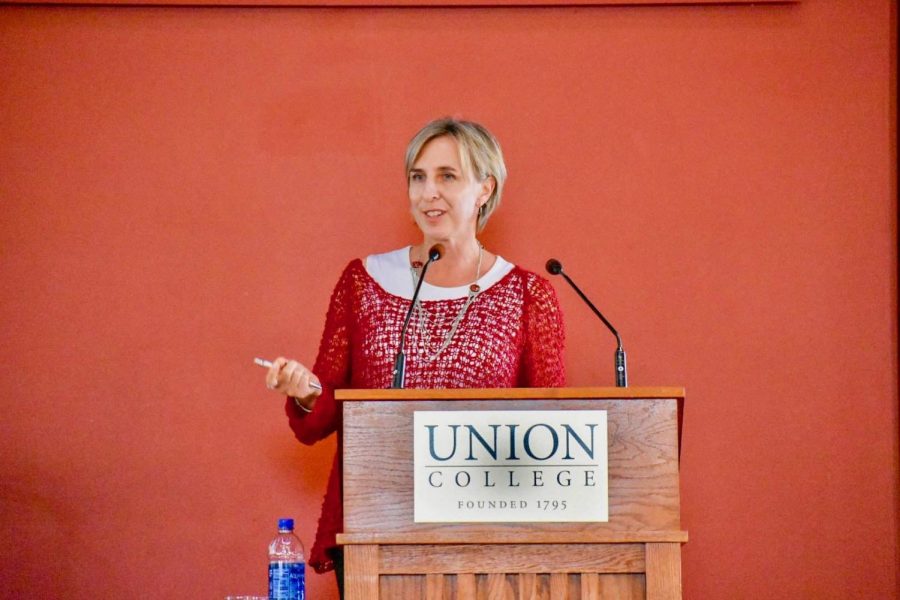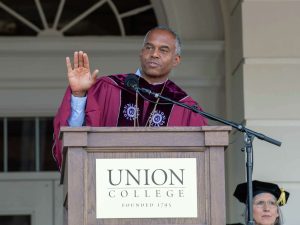Annual Religion and Conflict Lecture Held in the Nott
Professor Elizabeth Shakman Hurd of Northwestern University presents at the annual Wold Lecture on Religion and Conflict on September 20. Photo Courtesy of Delano McFarlane.
September 27, 2018
“Religion has been miscast as the cause of conflict and violence while also the solution to conflict and violence,” Professor Elizabeth Shakman Hurd of Northwestern University said, speaking of the Middle East at the start of her lecture, “Religion and Politics After Religious Freedom.” The lecture focused on the United States’ percieved attempts to promote the American idea of religious freedom abroad, specifically in the Middle East after the September 11 attacks.
Hurd was invited by the Department of Religious Studies to speak for the Annual Wold Lecture on Religion and Conflict. This lecture took place on Thursday, September 20 in the Nott Memorial.
After making this statement, Hurd then proceeded to assert three popular misconceptions about the United States’ involvement: the U.S. promotes religious freedom abroad, the return of attention to religion in international relations has fixed a long-standing problem and religious affiliation maps neatly onto peoples and nation-states and predicts political behavior.
“The reality is that the U.S. intervenes to align religion with American interests,” Hurd said.
She supported this claim with the examples of how U.S. Navy Chaplains were asked to give Koran lessons by radio to locals to counter the extremists’ lessons broadcast by the Taliban.
Similarly, a dispute about whether or not the U.S. could fund Mosque repair abroad, which it could, showed that the Constitution does not apply abroad and the government can show preference to whatever religion or establishment it so chooses. This also dispelled the popular argument that religious freedom abroad is a constitutional issue when it is entirely a foreign policy issue and led into the question, “Is it possible to have state-enforced religious freedom?”
To understand the question, Hurd defined three viewpoints on religion: “expert religion,” or religion as defined by self-proclaimed experts on the religion; “lived religion,” or religion as it is used on a dayto- day basis by its average practitioner; and “official,” or religion as it is enforced in law, either local or national. In foreign policy, the United States, specifically the Office of Religious Freedom and State, often defers to expert religion.
This creates privilege for regions that have experts who align with U.S. foreign policy goals.
Hurd debunked the second misconception she stated about U.S. interventionism: that the return of attention to religion in international relations has fixed a long-standing problem. Hurd asserted that not only has religion never been ignored, but that the world stage simply followed a doctrine of secularism during the Cold War and the politicization of U.S.-friendly religions has induced more conflict.
Hurd noted that the secularism, or the foreign policy of non-religion, has been replaced by “Tony Blair’s two faces of fate,” or the philosophy that “good” religion should be restored to international affairs and “bad” religion should be reformed or eradicated. This creates the debate of who decides whether a religion is “good” or “bad”. The entity in question would be the State Department, or specifically, the aforementioned Office of Religious Freedom and State.
“And what exactly do these people [in the State Department] think they’re doing?” said Hurd to laughter before talking about how the involvement of the United States leads to the silencing of dissenting voices and the uplifting of smaller factions of pro -U.S. voices.
Hurd dismissed the last misconception, that religious affiliation predicts political behavior, as a colonial thought, explaining that the concept that European powers could interact with a unified “Muslim world,” when no such thing existed, is “utterly asinine.
All of these misconceptions and the U.S. meddling result in the politicization of religion, which Hurd claimed to be the true cause of the conflict that was often blamed on religion.
To Hurd, religion cannot be detached from local policies and cultures. She subsequently argued that religion does not directly cause violence and cannot be used to prevent violence.
“People want to make religious freedom better, but it is not possible because you cannot define religion, what is and is not a religion. When you define, you exclude.”







